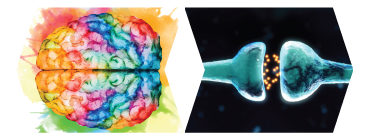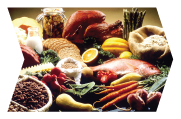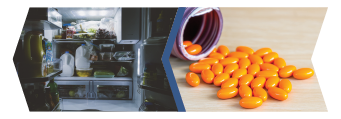You are here
Fitness 4Mind4Body: The Gut-Brain Connection

That gut-wrenching feeling in the pit of your stomach is all too real – your gut is sensitive to emotions like anger, anxiety, sadness, and joy – and your brain can react to signals from your stomach. All the more reason to eat a balanced and nutritious diet – so that your gut and your brain can be healthy.
What Is “The Gut”?
The gut includes every organ involved in digesting food and processing it into waste. The lining of your gut is often called “the second brain.”

How Is The Gut Connected To The Brain?
The gut or “second brain” can operate on its own and communicates back and forth with your actual brain. They are connected in two main ways:
PhysicallyThe vagus nerve, which controls messages to the gut as well as the heart, lungs, and other vital organs is the gut’s direct connection to the brain. |
 |
ChemicallyThe gut also connects with the brain through chemicals like hormones and neurotransmitters that send messages. |
 |
The chemical messages that pass between the gut and the brain can be affected by the bacteria, viruses, and fungi that live in the gut called the “gut microbiome.” |
 |
How Is The Gut Microbiome Related To Mental Health?
|
There is a strong relationship between having mental health problems and having gastrointestinal symptoms like heartburn, indigestion, acid reflux, bloating, pain, constipation, and/or diarrhea.1 |
Research in animals has shown that changes in the gut microbiome and inflammation in the gut can affect the brain and cause symptoms that look like Parkinson’s disease, autism, anxiety and depression. |
|
|
Having anxiety and depression can cause changes in the gut microbiome because of what happens in the body when it has a stress response.2 |
Tips For Taking Care Of Your Gut
Eating a balanced and nutritious diet is the most important thing a person can do to keep their gut healthy.
DoEat a diet full of whole grains, lean meats, fish, fruits, and vegetables. |
 |
 |
Don’tBase your diet on sugary, fried, or processed foods and soft drinks. |
Feed the good bacteria, viruses, and fungi that live in the gut what they like to help them grow.
These foods are called prebiotics.
| Prebiotic foods are high in fiber and work best when they are raw. Try asparagus, bananas (especially if they aren’t quite ripe), garlic, onions, or jicama. If you can’t stand the taste of these foods raw, you can try steaming them lightly to still get most of their prebiotic benefits. Tomatoes, apples, berries and mangos are also good prebiotic choices. |  |
You can also eat bacteria.
Probiotics are live bacteria that exist in foods.
 |
Eating probiotics can be tricky. The types and amounts of bacteria in probiotics vary, and when foods are heated the bacteria often die. Examples of probiotic foods are yogurt (the label should say live or active cultures), unpasteurized sauerkraut and kimchi, miso soup, kefir (a yogurt-like beverage), kombucha (fermented black tea), tempeh (made of soy beans), and apple cider vinegar. |
| You can also get probiotic supplements to help grow good gut bacteria, but it is important to pick the right ones. Make sure the type of bacteria is listed on the bottle – Bifidobacterium and Lactobacillus are some of the most common – and that the label says that the bacteria are live and there are billions of colony forming units (CFUs). Store them in a cool, dry place like the refrigerator. |  |
Other things to consider:
- Avoid taking antibiotics unless your doctor says they are absolutely necessary. Antibiotics kill bad bacteria, but also kill the good bacteria that keeps your gut working properly.
- If you have gut problems like an upset stomach or unusual bathroom habits that don’t go away it is important to see a doctor. Start with your primary care doctor. They may recommend you see a specialist called a gastroenterologist.
Join Mental Health America this May as we challenge ourselves to make small changes – both physically and mentally – to create hug gains for our overall health and wellbeing.

If you are taking steps to live a healthy lifestyle but still feel like you are struggling with your mental health, visit www.mhascreening.org to check your symptoms. It’s free, confidential, and anonymous. Once you have your results, we'll give you information and help you find tools and resources to feel better.
Sources
1Mussell, M, et al. Gastrointestinal symptoms in primary care: prevalence and association with depression and anxiety. (2008). Journal of Psychosomatic Research. 64(6): 605-612.
2Posserud I, Agerforz P, Ekman R, Björnsson ES, Abrahamsson H, Simrén M. Altered visceral perceptual and neuroendocrine response in patients with irritable bowel syndrome during mental stress. (2004). Gut. Aug 1;53(8):1102-8.
Special thanks to Dr. Pankaj Jay Pasricha and Ph.D. candidate Calliope Holingue of Johns Hopkins.








this page